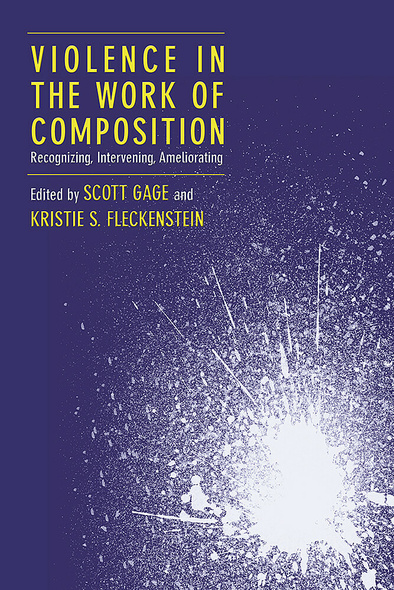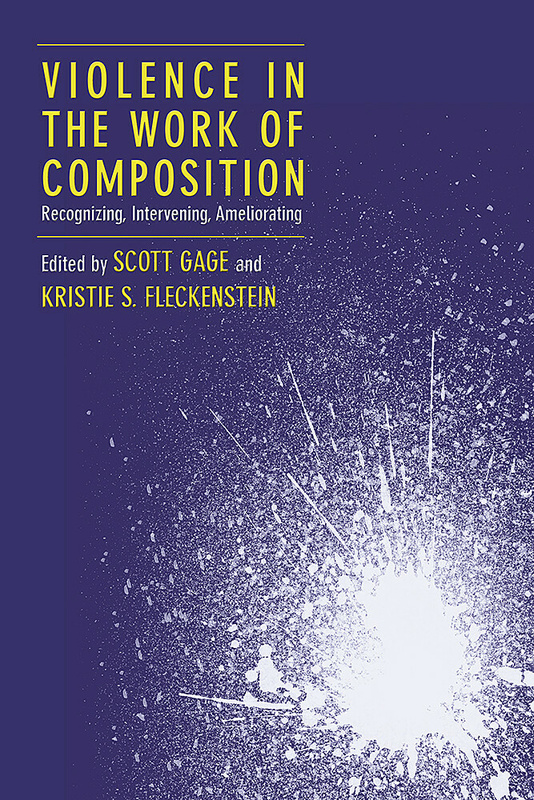Our shopping cart is currently down. To place an order, please contact our distributor, UTP Distribution, directly at utpbooks@utpress.utoronto.ca.
Violence in the Work of Composition
Recognizing, Intervening, Ameliorating
Edited by Scott Gage and Kristie S. Fleckenstein
Utah State University Press
Focusing on overt and covert violence and bringing attention to the many ways violence inflects and infects the teaching, administration, and scholarship of composition, Violence in the Work of Composition examines both forms of violence and the reciprocal relationships uniting them across the discipline. Addressing a range of spaces, the collection features chapters on classroom practices, writing centers, and writing program administration, examining the complicated ways writing instruction is interwoven with violence, as well as the equally complicated ways writing teachers may recognize and resist the presence and influence of violence in their work.
This book provides a focused, nuanced, and systematic discussion of violence and its presence and influence across pedagogical and administrative sites. Violence in the Work of Composition offers a close look at the nature of violence as it emerges in the work of composition; provides strategies for identifying violence, especially covert violence, addressing its impact and preventing its eruption across many sites; and invites readers to reflect on both the presence of violence and the hope for its cessation. Contributors consider, first, how compositionists can recognize the ways their work inadvertently enacts and/or perpetuates violence and, second, how they can intervene and mitigate that violence.
Rich with the voices of myriad stakeholders, Violence in the Work of Composition initiates an essential conversation about violence and literacy education at a time when violence in its many forms continues to shape our culture, communities, and educational systems.
Contributors: Kerry Banazek, Katherine Bridgman, Eric Camarillo, Elizabeth Chilbert Powers, Joshua Daniel, Lisa Dooley, Allison Hargreaves, Jamila Kareem, Lynn C. Lewis, Trevor Meyer, Cathryn Molloy, Kellie Sharp-Hoskins, Ellen Skirvin, Krista Speicher Sarraf, Thomas Sura, James Zimmerman
This book provides a focused, nuanced, and systematic discussion of violence and its presence and influence across pedagogical and administrative sites. Violence in the Work of Composition offers a close look at the nature of violence as it emerges in the work of composition; provides strategies for identifying violence, especially covert violence, addressing its impact and preventing its eruption across many sites; and invites readers to reflect on both the presence of violence and the hope for its cessation. Contributors consider, first, how compositionists can recognize the ways their work inadvertently enacts and/or perpetuates violence and, second, how they can intervene and mitigate that violence.
Rich with the voices of myriad stakeholders, Violence in the Work of Composition initiates an essential conversation about violence and literacy education at a time when violence in its many forms continues to shape our culture, communities, and educational systems.
Contributors: Kerry Banazek, Katherine Bridgman, Eric Camarillo, Elizabeth Chilbert Powers, Joshua Daniel, Lisa Dooley, Allison Hargreaves, Jamila Kareem, Lynn C. Lewis, Trevor Meyer, Cathryn Molloy, Kellie Sharp-Hoskins, Ellen Skirvin, Krista Speicher Sarraf, Thomas Sura, James Zimmerman
‘This collection is timely, offering practitioners pathways for understanding the extent of violence that circulates throughout composition studies. The voices here not only speak to the challenges involved with various forms of violence but also illuminate constructions on how to recognize, intervene, and ameliorate the complexities of violence in the work of composition.’
—Yndalecio Isaac Hinojosa, Texas A&M Corpus Christi
‘I can’t think of any work in our field that so comprehensively takes up how multifaceted violence is in the work of composition—and does so without giving up on the possibility of teaching and writing for a world less violent and more just.’
—Nancy Welch, University of Vermont
Scott Gage is associate professor of English and director of First-Year Composition at Texas A&M University–San Antonio. His research addressing the intersections of rhetoric, violence, and white supremacy appears in College English, Computers and Composition, and other journals and edited collections.
Kristie S. Fleckenstein is professor of English at Florida State University. She is the recipient of the 2005 CCCC Outstanding Book of the Year Award for Embodied Literacies: Imageword and a Poetics of Teaching and the 2009 W. Ross Winterowd Award for Best Book in Composition Theory for Vision, Rhetoric, and Social Action in the Composition Classroom.
Kristie S. Fleckenstein is professor of English at Florida State University. She is the recipient of the 2005 CCCC Outstanding Book of the Year Award for Embodied Literacies: Imageword and a Poetics of Teaching and the 2009 W. Ross Winterowd Award for Best Book in Composition Theory for Vision, Rhetoric, and Social Action in the Composition Classroom.





